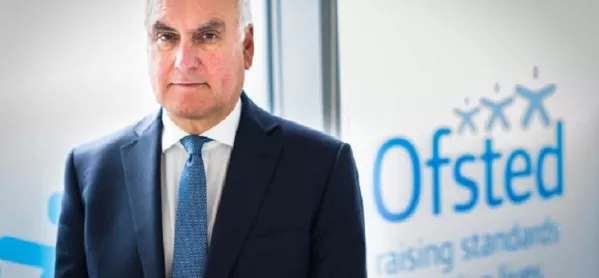Sir Michael Wilshaw is to lambast those who “bleat about the tyranny of testing” and warn that teacher shortages are leading to poor performance, in an outspoken speech this morning.
Ofsted’s chief inspector will say that children from poor backgrounds “languish at the bottom of the educational pile” because they have less access to good teaching than children from wealthier areas.
And he will accuse those opposed to testing of “irresponsibility” and a “thoughtless crusade” that harms poorer pupils.
“What is hard to forgive is our continuing failure as a nation to improve the lives of our poorest children,” Sir Michael will say. “And the irony is not lost on me saying this in a school bedecked with privilege and to which poor children would love to go…
“As I begin my last few months as chief inspector, it saddens me immeasurably to say, frankly, that we are still letting down our poorest children and that if things do not change fundamentally, we will continue to do so.”
Sir Michael will say that “weak” headteachers often complain about testing, but that in his view testing “isn’t a burden; it’s an opportunity”.
“It allows teachers to know where a child stands and what help they need. It gives the poor a passport to the prospect of a better life,” he will say, adding that there should be tests for pupils at key stage 3 “so the poor in particular can benefit from formal assessment.”
“Take testing and exams away and the poor can’t rely on the cultural capital or family connections that middle-class children possess,” he will say. “The irresponsibility of the anti-testing lobby in this regard is breathtaking. It is the disadvantaged who suffer from their thoughtless crusade.”
‘The poorest pupils suffer’
Sir Michael will say that schools in deprived areas struggle to recruit teachers and that this problem has been “exacerbated as teacher recruitment becomes more difficult”. This is one of the reasons why “the poor continue to languish at the bottom of the educational pile”, he will say.
“The lack of a national, strategic approach to teacher training means that there are challenging areas of the country without ready access to the best newly qualified teachers. Outstanding schools train and retain the best candidates, leaving schools where the need is greatest to scramble for the rest.”
Sir Michael, who will leave the role in December, is due to address teachers and heads at the Festival of Education at the independent Wellington College in Berkshire today.
The Ofsted chief will say to those who have challenged his approach during his time in the role: “Since this is the papal year of mercy, I forgive them.”
“If I have stirred up emotions from time to time and caused offence by speaking bluntly, then I apologise,” he will say. “But I have been a chief inspector in a hurry, impatient to bring about improvement through inspection.”
And he will criticise what he describes as the “political ideologues of both Left and Right”, accusing those on the Left during the 1970s and 80s of “peddling anti-academic nonsense” that “ruined the education of hundreds of thousands of our poorest children − children now in middle-age whose literacy levels are worse than their parents’ and grandparents’.
“The Right has had a different but no less corrosive impact on the poor,” he will say. “In the 70s and 80s their principal crime was wilful neglect. If a disadvantaged youngster couldn’t get into a grammar school - tough. The 11-plus failures were just useful fodder for factories and shops.”
He will warn that an “inflexible curriculum” has led to “demotivated youngsters” and “thousands of skilled vacancies that go unfilled and are eventually filled by those from abroad”, and will call for more pupils to have access to a technical curriculum.
But he will stress that he is not opposed to academic rigour and the importance of knowledge: “I was insisting on the primacy of subject knowledge and the importance of an academic bedrock when many latter-day evangelists were negotiating their way around a Wagon Wheel.”
Want to keep up with the latest education news and opinion? Follow TES on Twitter and like TES on Facebook




